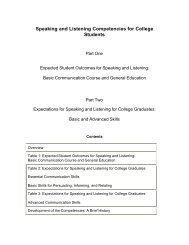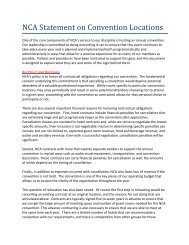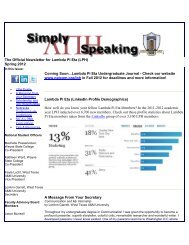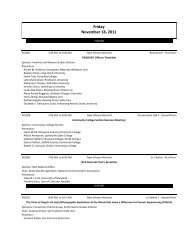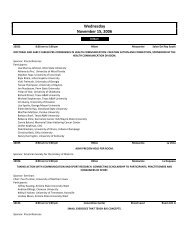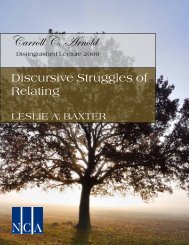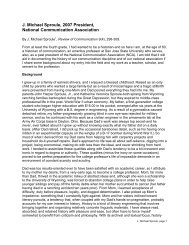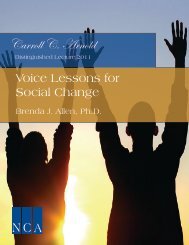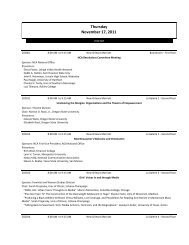Beverly Whitaker Long, 1985 - National Communication Association
Beverly Whitaker Long, 1985 - National Communication Association
Beverly Whitaker Long, 1985 - National Communication Association
You also want an ePaper? Increase the reach of your titles
YUMPU automatically turns print PDFs into web optimized ePapers that Google loves.
230 B. W. <strong>Long</strong>Downloaded by [Mr Trevor Parry-Giles] at 13:20 29 January 2013I took four of them and left armed with exciting and invaluable tools that wouldevolve later into theories of describing and evaluating literary works and literature inperformance.In my first college teaching at Southwest Texas State in San Marcos, I encounteredtwo more nurturing male administrators, Elton Abernathy, department chair, andJim Barton, director of the theatre. I was hired to costume four major productions ayear, direct children’s theatre, teach introduction to speech (four sections eachsemester) and oral interpretation, and if I were lucky, team up to teach aninterdisciplinary theatre appreciation class. I never learned so much as I did workingwith Elton and Jim and also with faculty from a wide variety of disciplines, anassociation made possible by the size of the institution. Perhaps the major discoveryof this period was my realizing that although I was committed to performance, thetexts I was most attracted to were poems and narrative. From that point on, I wasfocused on the performance of literature.At LSU and at San Marcos I discovered the pleasure and power of my womencolleagues. I’m not sure I’ve ever made a professional decision without discussing itwith Mary Frances Hopkins and Gresdna Doty (and later, Mary Strine). They were*and are*collaborators, questioners, enablers. Never pushy or judgmental, theyprofoundly affected my thinking and my practices. I learned from them what‘‘feminist,’’ in its richest sense, meant.While at San Marcos, I attended my first professional convention, the Texas Speech<strong>Association</strong> in Galveston. It was fun and I got to see Robert and Gertrude Breenperform ‘‘Miss Brill,’’ in a style they called Chamber Theatre. The next year I tookstudents to the Southern Speech Convention in North Carolina. In 1966 I attendedthe <strong>National</strong> Convention of Teachers of English, and, in 1967 my first SCAconvention, where I delivered a paper on aesthetic distance. Since that time, I’vemissed few Southern conventions (serving as president in 1975) and no nationalones. The conventions were always energizing and often inspirational.In 1968 I met Bob Jeffrey, new chair of the Department of Speech at the Universityof Texas. He was my boss, adviser, soul mate, friend, even cast member. He knew howto get things done, and he knew what was worth doing. He was open, kind shrewd,and visionary. And he generously shared his wisdom, making him a mentor of thehighest order. He (and his wife, Phillis) encouraged, advised, even pushed, my workin SCA. He was on the nominating committee (along with Dennis Gouran) thatasked me to be a candidate for the <strong>1985</strong> presidency.By that time, I had left the University of Texas to be with my husband, Bill <strong>Long</strong>.Some colleagues were amazed that I could give up a professorship at UT and move toIndiana. I loved Texas but there was no contest. In 1977 Bill took early retirement, adecision that coincided with my being offered a job at the University of NorthCarolina at Chapel Hill. I thought I was going there to be a full-time teacher/researcher, but what the department needed was a chair and I was the most likelycandidate. Most of the faculty were much younger than I, so it was challenging andrewarding to support them in building their professional careers.




